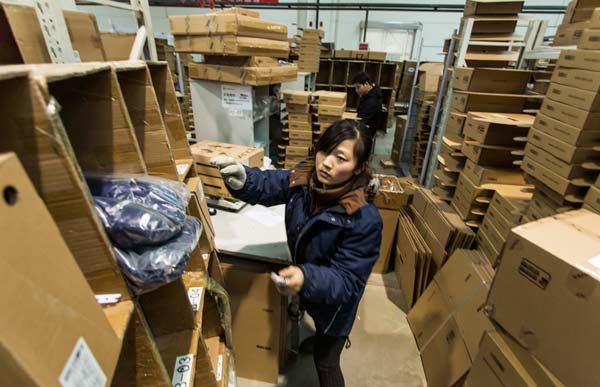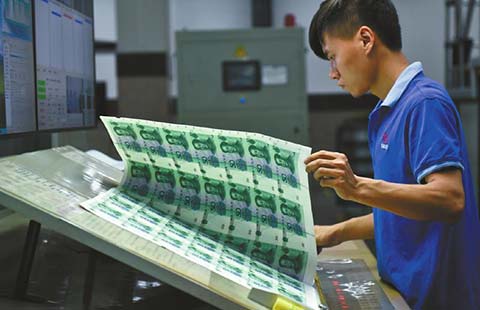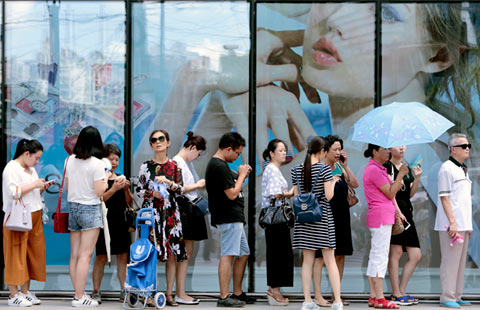

Companies test water abroad as domestic market getting tougher, Chen Limin reports.
While e-commerce companies have plunged into ever-increasing competition in the Chinese domestic market, some are trying their luck outside China to find other ways to fuel growth. A number of Chinese e-commerce players, including Jingdong Mall, dubbed China's amazon.com, and online clothing retailer Vancl (Beijing) Technology Co, have already stretched their reach globally with different approaches.
 |
|
The warehouse of online clothing retailer Vancl (Beijing) Technology Co in Beijing’s Daxing county. [Photo provided to China Daily] |
Jingdong Mall's English-language website, offering nearly 400,000 products, went online in October. Supporting delivery to 35 countries, it attracts most of its overseas customers from North America, Western Europe and Australia.
Vancl started even earlier. It began its overseas expansion in 2010 by providing an English version of its website, and in September, it teamed up with Vietnamese online payment company ECPay to provide a Vietnamese-language website and set up local operations.
"Vietnam is quite representative of Asian markets: Fast-growing with a considerable market size and similar in culture," Luan Yilai, Vancl's associate president, said.
"We think we can grow quickly if we start in Vietnam."
Luan said Vancl is considering expanding its global footprint to more markets, and Russia, where it is looking for possible cooperation, will probably be next.
Jingdong Mall also has a Russian-language website and sells products to the country through cooperation with a local partner, said a report by Nanfang Metropolis Daily that cited unnamed sources. Jingdong Mall didn't comment on this.
E-commerce companies are the latest batch of Chinese Internet companies to spread their global reach. The earliest ones to go global were online game providers, which started overseas adventures in 2003.
Chinese e-commerce companies tend to provide an English website targeting US and European customers when they start to go global, said Chen Dong, the China head of large merchant sales at PayPal, the online payment arm of online marketplace Ebay.
However, emerging markets represent a bigger opportunity for e-commerce businesses that expand overseas, as is evident in the huge growth in exports by e-commerce businesses to Latin America, Eastern Europe and the Asia-Pacific region, Chen added.
From July 2011 to June 2012, exports by Chinese e-commerce companies to Argentina increased by 96 percent, to Israel by 72 percent and to Ukraine by 71 percent, according to PayPal figures.
Global strategies
Although China is expected to become the world's biggest online retail market this year, according to officials of the Ministry of Commerce, e-commerce companies' global expansion comes as an important supplement to their business in the home market.
"Vancl is, and will be, focused on its domestic market, but the intention to go global is quite natural, whether it's the brand or the manufacturing that goes outside China," said Luan.
Last year, Vancl moved some of its clothes production to Bangladesh, and it was also approaching manufacturers in Indonesia and Cambodia for possible cooperation, Hu Haishen, who is responsible for Vancl's clothes manufacturing, said in August.
There were 31 million people accessing the Internet in Vietnam by the end of September, representing 34 percent of its population, according to the Nhan Dan newspaper.
China, in contrast, had an Internet population of 538 million by the end of June, representing nearly 40 percent of its population, according to the quasi-official China Internet Network Information Center.
What is different from its Chinese operations, though, is Vancl's pricing in the market.
"Vietnam is like China a number of years ago where rich people buy luxury goods and those with little income go to wholesale markets. There are few fashion brands in between targeting the middle and high-end market," he said, explaining the reason for Vancl's brand positioning in Vietnam.
The company began its expansion in Vietnam with a limited number of products, about 300 kinds of clothes, on a trial basis as it is still learning how to work with a partner in a foreign country, Luan said.
Compared with Vancl, Jingdong Mall seems to be less aggressive in its global expansion, without stepping much into local operations. It buys made-in-China goods and then ships them overseas.
However, Shi Tao, Jingdong Mall's vice-president, told China Daily that the company plans to build warehouses overseas to eventually shorten the delivery period.
He said the ultimate goal for Jingdong Mall is to act like Amazon, which does business in different countries locally, and has a diverse source for products.
By June, almost all of Jingdong Mall's 60 million registered users were from the Chinese mainland. US-based Amazon, the world's biggest online retailer by user number, has more than 60 percent of its customers coming from countries outside North America, said US research firm comScore Inc.
Currently, the most popular categories on Jingdong Mall's English-language website include Chinese books, electronic accessories and clothing, which take up more than 70 percent of its overseas sales, the company said.
Luan with Vancl, however, said the company didn't set a goal for its overseas business, nor has its business overseas registered "breakthrough growth", and everything currently going on is more of an exploration of how to go global.
E-commerce companies' efforts for expansion come when the domestic e-commerce market has been increasingly tough, especially in the last year. A large number of players are competing head-to-head with cutthroat price wars, which helps them lure users but squeezes their profit margins.
"Compared with the domestic market, e-commerce players are likely to have higher profit margins in the international market," said Li Chengdong, an e-commerce analyst and columnist of the Chinese website of The New York Times.
Hu Yanping, general manager of the Data Center of China Internet, a Chinese market research company, agreed. However, fierce competition in the domestic market is not the reason for e-commerce players to go global, he said.
"Going global will be part of the future, something you need to do other than your main business in China even though it's not urgent now."
For Luan, going global is by no means easy. What Vancl spent most of its time exploring overseas is how to rebuild the whole process of doing online retail business and providing localized services to the market.
"You are also exposed to other risks," he said, referring to a protest against China in Vietnam in early December, which led to a delay of Vancl's more aggressive plan to expand its sales in the country.
 Crops enter harvest season
Crops enter harvest season
 Top 10 foreign destinations for Chinese tourists
Top 10 foreign destinations for Chinese tourists
 Dlodlo offers VR in your pocket
Dlodlo offers VR in your pocket
 Former NBA star Yao Ming's investment empire
Former NBA star Yao Ming's investment empire
 Dough figurine artist creates mini-mes for loving couples at Qixi festival
Dough figurine artist creates mini-mes for loving couples at Qixi festival
 Close-up view of money-printing company
Close-up view of money-printing company
 Duty free shop competes for consumers
Duty free shop competes for consumers
 Top 6 items students will spend most during summer holiday
Top 6 items students will spend most during summer holiday